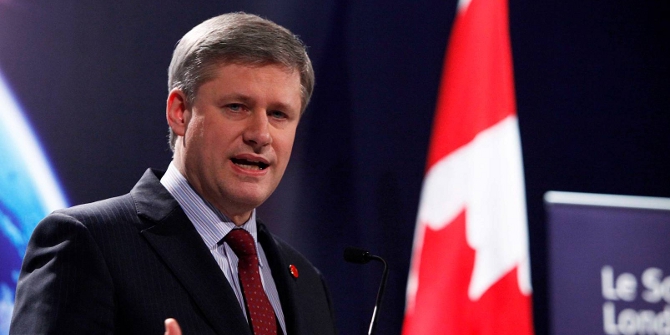 In this book, Jorg Friedrichs argues that industrial society itself is transitory, and he examines the prospects for our civilization’s coming to terms with its two most imminent choke points: climate change and energy scarcity. The author contends that industrial civilization cannot outlast our ability to burn fossil fuels and that the demise of industrial society would entail cataclysmic change, including population decreases. Sarah Lester writes that while this is a well-sourced book with a reasonable argument, readers might have to look elsewhere to get a a more nuanced view on the future of this debate.
In this book, Jorg Friedrichs argues that industrial society itself is transitory, and he examines the prospects for our civilization’s coming to terms with its two most imminent choke points: climate change and energy scarcity. The author contends that industrial civilization cannot outlast our ability to burn fossil fuels and that the demise of industrial society would entail cataclysmic change, including population decreases. Sarah Lester writes that while this is a well-sourced book with a reasonable argument, readers might have to look elsewhere to get a a more nuanced view on the future of this debate.
 The Future Is Not What it Used to Be: Climate Change and Energy Scarcity. Jörg Friedrichs. MIT Press. September 2013.
The Future Is Not What it Used to Be: Climate Change and Energy Scarcity. Jörg Friedrichs. MIT Press. September 2013.
In his book The Future Is Not What it Used to Be, Jörg Friedrichs outlines the argument that ‘industrial civilisation cannot outlast our ability to burn fossil fuels’ through examining historical cases of climate stress and energy scarcity. Overall, the book provides some intelligent arguments and facts on these issues, including a particularly good discussion of discounting in chapter six. For readers new to the topic the ‘bottom line’ structure at the end of each chapter provides a very helpful summary.The basis of the book links two constraints – energy scarcity (focused on the peak oil debate but including a summary of other resource limits) and climate change as a key driver for society. Despite the dubious analogy of people likened to turkeys on the first page, the book quickly skips to a reasonable discussion of the ‘human predicament’, which can summarised from the book as humans live on a finite planet, with finite resources, coping with an expanding population. During the first chapter, the old diatribes on Malthus and the limits of growth are rehearsed in a well written way, whilst a nod is given to those with reservations about the nature of economic growth, political regulation, and technological solutions to the problem. The author then quickly moves onto the twin-pillars of his argument energy scarcity and climate change.
First we come to climate change – a rapid but thorough overview of the science enables the reader to quickly grasp the core aspects of the problem and gain a reasonable technical understanding of rising temperatures, precipitation changes, sea level rise and extreme weather. Here, the author also introduces the notion of climate change as a risk issue and the possibilities of mitigation, squeezing in a superficial overview of technologies such as geo-engineering and Carbon Capture and Storage (CCS).
So far, so good! We are then led through a whistle-stop tour of the energy scarcity debate –revolving around peak oil, but including carbon foot-printing of fuels, unconventional oil, coal reserves, nuclear, and eventually renewables. However, what is evidently lacking here is a debate of truly radical or major behavioural shifts. The author poses that ‘any solution is likely to be based on a combination of four elements: lower energy consumption, better energy efficiency, a switch from fossil fuels to other forms of energy, and carbon capture and storage’ (p.42). But Friedrichs then fails to substantively discuss any of these during the remainder of the book. Furthermore, while the author claims to discuss ‘bold visions’ and the ‘most radical voices’ (p.42), he barely touches on such topics and instead provides a nicely written summary of the International Energy Agency’s future energy predications.
In general, the reader is left unconvinced by the book’s brief discussion of society’s ‘Catch 22’ situation (p.44), especially as the author notes that from an ‘ideal perspective, a shift to renewable energy is an obvious no-regrets strategy to deal with both peak oil and climate change’ (p.45). It is claimed that the ‘real world is a far cry from win-win’ (p.45). Why? Certainly the book offers no convincing argument or facts as to why renewables, energy efficiency and behavioural change can’t offer a suitable de-carbonisation strategy, while both academic and policy recommendations often suggest this combination can. The author has so far managed to convince the reader about the dual threats of climate change and energy scarcity, so this debate could be left, in my opinion, at the end of chapter two, but chapter three contains another, albeit fuller, description of what the climate can change.

In chapter four, “When Energy Runs Short”, energy scarcity and climate change are covered as constraints on the energy system. Again, there is the hope that the chapter will focus on the realistic challenges of the moral (climate change) and practical (energy scarcity) drivers of change. Instead there is another section on peak oil and a series of under-developed historical case studies. Of these, the case of ‘socio-economic adaption in Cuba in the 1990s (p.90) could lend real insight into today’s behavioural change problems, but ideas on social cohesion and locally-led change are largely left aside. One very positive note about the book, the historical comparison sections – for example on Japan, North Korea, and Cuba – provide a very interesting perspective that suggests fascinating cultural adaption possibilities and highlights the potential value of the book as a history rather than a guide for policy-makers or for a public interested in how to address climate change.
Having presented scientific knowledge-making in a useful summary in chapter five, the book’s penultimate chapter focuses on the “Moral Economy of Inaction”. One of the real joys of the book is this chapter’s discussion of ethical discounting, which can be explained as ‘when our behaviour is unsustainable in the long run, and/or when it is damaging to distant others, we have a tendency to discount the effects and focus on the here and now’ (p.142): linking the concept of temporal discounting (valuing others over time), spatial discounting (valuing others based on geographical or emotional distance), and a well thought-out discussion on economic discounting, collective action problems and the function of denial. Other than the cost equations for denial, the chapter gives an excellent and accessible overview of how economists (and now policy-makers) make decisions on how to value people and the environment over time.
However, in addressing the question of denial, the author runs aground by proposing the strategy of ‘rational persuasion’ (p.163) to convince climate change sceptics and the public to change their actions. After over 20 years of comprehensive climate change science, multiple reports from the IPCC and a concerted effort by European governments to ‘rationally persuade’ people to take action, we can safely say the disbursement of ‘objective information’ (p.166) alone has not worked and is not going to work. The author even begins to recognise this at the end of the chapter, switches tack, and re-routes into the final chapter Where to Go from Here.
Arguably, given the risks of global climate change and the damage a world acting under energy scarcity could bring, the final chapter is not the place for a discussion of ‘existential anxiety’, nor to stop and ‘ponder’ the best thing for moral individuals to do, or even to bring denialist turkeys into the debate (p.170). This is the place in the book for real, concrete, useable, suggestions for the future. The bottom line of this chapter, and indeed the book, is disappointing, with no real ideas or conclusions provided. Additionally, the religious turn in the final phrases of the book may particularly annoy some readers, being a completely needless moral chastisement.
In summary, following the highs and lows of a relatively well-written, well-sourced book, Friedrichs has provided a reasonable argument that ‘the future is not what it used to be’ but gives no clues, or advice, or meaningful suggestions of where we go next.
Please read our comments policy before commenting.
Note: This article gives the views of the authors, and not the position of USApp– American Politics and Policy, nor of the London School of Economics.
Shortened URL for this post: http://bit.ly/1c3N0jz
—————————————–
 Sarah Lester – UK Department for International Development
Sarah Lester – UK Department for International Development
Sarah Lester is Climate and Energy Adviser at the UK Department for International Development (DFID). All blog pieces are written in her personal capacity. Prior to working for DFID Sarah was Research and Policy Impact Analyst at the Grantham Institute, Imperial College London. Working broadly across the climate and energy sectors she has also held previous positions with the Climate Policy Initiative based at the German Institute for Economic Research (DIW Berlin) and the Electricity Policy Research Group at the University of Cambridge. Read more reviews by Sarah.






